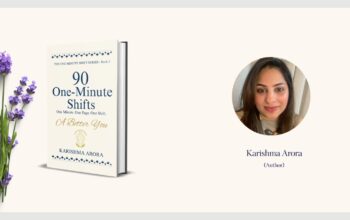Rakesh Balaji is a Lead Graphic Designer with over nine years of experience in the creative industry, currently working with two prominent brands in Chennai. Beyond his professional expertise, he is also a dedicated Betterment Coach for Alcohol Addiction and the author of Dear Rehab: From Addiction to Hope. Drawing from his personal battle with alcohol addiction, Rakesh has become a passionate advocate for recovery, using his own story to inspire change and provide hope to others. Through his YouTube channel, Rakeshology, and his writing, he shares insights, guidance, and support to individuals and families facing the challenges of addiction, empowering them to embrace transformation and a better future.
The Literature Times: What inspired you to write ‘Dear Rehab: From Addiction to Hope’? Was there a specific moment or experience that motivated you to share your journey with others?
Rakesh Balaji: Writing Dear Rehab was deeply personal for me. After overcoming my own battle with alcohol addiction, I realized there’s a gap in understanding addiction, not just for those struggling but also for their families. One specific moment that inspired me was seeing the pain in my family’s eyes during my darkest days. It was then I decided to turn my experiences into a guide that could help others find hope, recovery, and healing.
The Literature Times: In your book, you describe addiction not only as a physical condition but also as a psychological and emotional struggle. Could you elaborate on how understanding the mindset of an addict is crucial for both the individual and their family members?
Rakesh Balaji: Addiction is not just about the substance; it’s about the reasons behind the dependency. Understanding the mindset of an addict helps uncover the pain, trauma, or circumstances that led them to seek solace in alcohol. For families, recognizing this helps shift the narrative from blame to empathy, creating an environment where recovery becomes possible. For the individual, it’s about realizing that their addiction doesn’t define them, and change is achievable with the right mindset.
The Literature Times: You’ve been through the challenges of alcohol addiction yourself. How did your personal experiences shape the way you approached writing this book and offering advice to others?
Rakesh Balaji: My personal experiences gave me the ability to write with authenticity and vulnerability. I didn’t want Dear Rehab to be just another book about addiction; I wanted it to resonate with people on a human level. The advice I offer isn’t theoretical—it’s what worked for me. I share my struggles, victories, and even relapses to show readers that recovery is not a straight line, but it’s worth the effort.
The Literature Times: What would you say is the most misunderstood aspect of addiction, and how does ‘Dear Rehab’ aim to clear up that misconception?
Rakesh Balaji: The most misunderstood aspect of addiction is that it’s seen as a moral failure or a lack of willpower. In reality, addiction is a complex disease that involves both the body and mind. Dear Rehab aims to clear this misconception by showing that recovery isn’t about judgment—it’s about understanding the root causes and taking steps to heal. It highlights the need for empathy, support, and professional help in overcoming addiction.
The Literature Times: In the book, you emphasize the importance of family support and creating a non-judgmental environment. Can you share some practical steps for families to help their loved ones without enabling them?
Rakesh Balaji: Families can start by listening without judgment and educating themselves about addiction. It’s important to set healthy boundaries, like not supporting destructive behaviors, while still offering emotional support. Encourage them to seek professional help, and be there for them during the process. Avoid trying to “fix” everything—sometimes just being present is enough.
The Literature Times: Relapse is a common challenge in addiction recovery, and you address it with great empathy. How can individuals in recovery, and their families, approach relapse in a healthier, more constructive way?
Rakesh Balaji: Relapse should be seen as a part of the recovery process, not a failure. For individuals, it’s an opportunity to learn what triggered the setback and how to address it moving forward. Families can support this by avoiding blame and focusing on solutions. Open communication, revisiting treatment plans, and seeking professional help can make a big difference in navigating a relapse constructively.
The Literature Times: You highlight the role of professional help in the recovery process. Can you talk about some of the most valuable resources or forms of professional intervention that you believe are essential for someone struggling with addiction?
Rakesh Balaji: Rehabilitation centers, therapy, and support groups like Alcoholics Anonymous are invaluable. They provide structured environments where individuals can confront their addiction with the guidance of professionals. I also believe in the power of counseling for both the addict and their families to address the emotional and psychological aspects of recovery.
The Literature Times: As a Betterment Coach for Alcohol Addiction, you’ve helped others overcome addiction. How does your coaching differ from traditional therapy or rehab programs, and how do you integrate your personal experiences into your approach?
Rakesh Balaji: My coaching focuses on empathy and practicality. While traditional therapy often deals with the clinical side, I bring a personal perspective that allows me to connect with individuals on a deeper level. I focus on actionable steps, like building daily routines, finding motivation, and addressing emotional triggers, while sharing lessons from my own journey to inspire hope.
The Literature Times: Through ‘Dear Rehab’, you aim to provide a roadmap for recovery. What would you say is the most critical step in the early stages of addiction recovery, and how can individuals take that first step towards change?
Rakesh Balaji: The most critical step is acknowledging the problem and deciding to seek help. That moment of self-awareness is powerful because it opens the door to change. For individuals, I recommend starting small—talk to someone you trust, join a support group, or visit a rehab center. The first step doesn’t have to be perfect; it just needs to be taken.
The Literature Times: Looking ahead, what do you hope readers will take away from Dear Rehab? Is there a particular message or insight that you hope resonates deeply with them, whether they are struggling with addiction themselves or supporting someone who is?
Rakesh Balaji: I hope readers understand that addiction doesn’t define a person, and recovery is always possible. Whether they’re struggling or supporting someone, I want them to take away the message that empathy, support, and action can transform lives. At its core, Dear Rehab is about hope—not just for the individual, but for the families and communities impacted by addiction.



